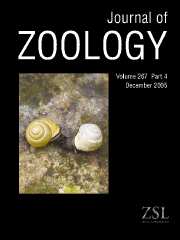Crossref Citations
This article has been cited by the following publications. This list is generated based on data provided by
Crossref.
Lin, Zhi-Hua
Ji, Xiang
Luo, Lai-Gao
and
Ma, Xiao-Mei
2005.
Incubation temperature affects hatching success, embryonic expenditure of energy and hatchling phenotypes of a prolonged egg-retaining snake, Deinagkistrodon acutus (Viperidae).
Journal of Thermal Biology,
Vol. 30,
Issue. 4,
p.
289.
Booth, David T.
2006.
Influence of Incubation Temperature on Hatchling Phenotype in Reptiles.
Physiological and Biochemical Zoology,
Vol. 79,
Issue. 2,
p.
274.
Ji, Xiang
Lin, Long-Hui
Lin, Chi-Xian
Qiu, Qing-Bo
and
Du, Yu
2006.
Sexual Dimorphism and Female Reproduction in the Many-Lined Sun Skink (Mabuya multifasciata) from China.
Journal of Herpetology,
Vol. 40,
Issue. 3,
p.
351.
Du, Wei-Guo
Zheng, Rong-Quan
and
Shu, Lin
2006.
The Influence of Incubation Temperature on Morphology, Locomotor Performance, and Cold Tolerance of Hatchling Chinese Three-Keeled Pond Turtles, Chinemys reevesii.
Chelonian Conservation and Biology,
Vol. 5,
Issue. 2,
p.
294.
Lu, Hong-Liang
Ji, Xiang
Lin, Long-Hui
and
Zhang, Ling
2006.
Relatively low upper threshold temperature in lizards from cool habitats.
Journal of Thermal Biology,
Vol. 31,
Issue. 3,
p.
256.
JI, XIANG
LIN, LONG-HUI
LUO, LAI-GAO
LU, HONG-LIANG
GAO, JIAN-FANG
and
HAN, JUN
2006.
Gestation temperature affects sexual phenotype, morphology, locomotor performance, and growth of neonatal brown forest skinks, Sphenomorphus indicus.
Biological Journal of the Linnean Society,
Vol. 88,
Issue. 3,
p.
453.
Du, Wei-Guo
Hu, Ling-Jun
Lu, Jian-Lei
and
Zhu, Ling-Jun
2007.
Effects of incubation temperature on embryonic development rate, sex ratio and post-hatching growth in the Chinese three-keeled pond turtle, Chinemys reevesii.
Aquaculture,
Vol. 272,
Issue. 1-4,
p.
747.
Fordham, Damien A.
Georges, Arthur
and
Corey, Ben
2007.
Optimal conditions for egg storage, incubation and post-hatching growth for the freshwater turtle, Chelodina rugosa: Science in support of an indigenous enterprise.
Aquaculture,
Vol. 270,
Issue. 1-4,
p.
105.
JI, X.
LIN, C.‐X.
LIN, L.‐H.
QIU, Q.‐B.
and
DU, Y.
2007.
Evolution of viviparity in warm‐climate lizards: an experimental test of the maternal manipulation hypothesis.
Journal of Evolutionary Biology,
Vol. 20,
Issue. 3,
p.
1037.
Goodman, Rachel M.
2008.
Latent effects of egg incubation temperature on growth in the lizard Anolis carolinensis.
Journal of Experimental Zoology Part A: Ecological Genetics and Physiology,
Vol. 309A,
Issue. 9,
p.
525.
Lin, Long-Hui
Li, Hong
An, Hong
and
Ji, Xiang
2008.
Do temperature fluctuations during incubation always play an important role in shaping the phenotype of hatchling reptiles?.
Journal of Thermal Biology,
Vol. 33,
Issue. 3,
p.
193.
Du, Wei-Guo
Radder, Rajkumar S.
Sun, Bo
and
Shine, Richard
2009.
Determinants of incubation period: do reptilian embryos hatch after a fixed total number of heart beats?.
Journal of Experimental Biology,
Vol. 212,
Issue. 9,
p.
1302.
Lu, Hong-Liang
Hu, Rui-Bin
and
Ji, Xiang
2009.
The variance of incubation temperatures does not affect the phenotype of hatchlings in a colubrid snake, Xenochrophis piscator.
Journal of Thermal Biology,
Vol. 34,
Issue. 3,
p.
138.
Du, Wei-Guo
Shen, Jian-Wei
and
Wang, Lei
2009.
Embryonic development rate and hatchling phenotypes in the Chinese three-keeled pond turtle (Chinemys reevesii): The influence of fluctuating temperature versus constant temperature.
Journal of Thermal Biology,
Vol. 34,
Issue. 5,
p.
250.
Páez, Vivian P.
Correa, Juana C.
Cano, Amalia M.
and
Bock, Brian C.
2009.
A Comparison of Maternal and Temperature Effects on Sex, Size, and Growth of Hatchlings of the Magdalena River Turtle (Podocnemis lewyana) Incubated under Field and Controlled Laboratory Conditions.
Copeia,
Vol. 2009,
Issue. 4,
p.
698.
Les, Heather L.
Paitz, Ryan T.
and
Bowden, Rachel M.
2009.
Living at Extremes: Development at the Edges of Viable Temperature under Constant and Fluctuating Conditions.
Physiological and Biochemical Zoology,
Vol. 82,
Issue. 2,
p.
105.
Ferreira Júnior, Paulo Dias
2009.
Aspectos ecológicos da determinação sexual em tartarugas.
Acta Amazonica,
Vol. 39,
Issue. 1,
p.
139.
Paitz, Ryan T.
Gould, Amelia C.
Holgersson, Mikael C.N.
and
Bowden, Rachel M.
2010.
Temperature, phenotype, and the evolution of temperature‐dependent sex determination: how do natural incubations compare to laboratory incubations?.
Journal of Experimental Zoology Part B: Molecular and Developmental Evolution,
Vol. 314B,
Issue. 1,
p.
86.
Du, Wei-Guo
Wang, Lei
and
Shen, Jian-Wei
2010.
Optimal temperatures for egg incubation in two Geoemydid turtles: Ocadia sinensis and Mauremys mutica.
Aquaculture,
Vol. 305,
Issue. 1-4,
p.
138.
Gao, Jian-Fang
Qu, Yan-Fu
Luo, Lai-Gao
and
Ji, Xiang
2010.
Evolution of Reptilian Viviparity: A Test of the Maternal Manipulation Hypothesis in a Temperate Snake,Gloydius brevicaudus(Viperidae).
Zoological Science,
Vol. 27,
Issue. 3,
p.
248.




